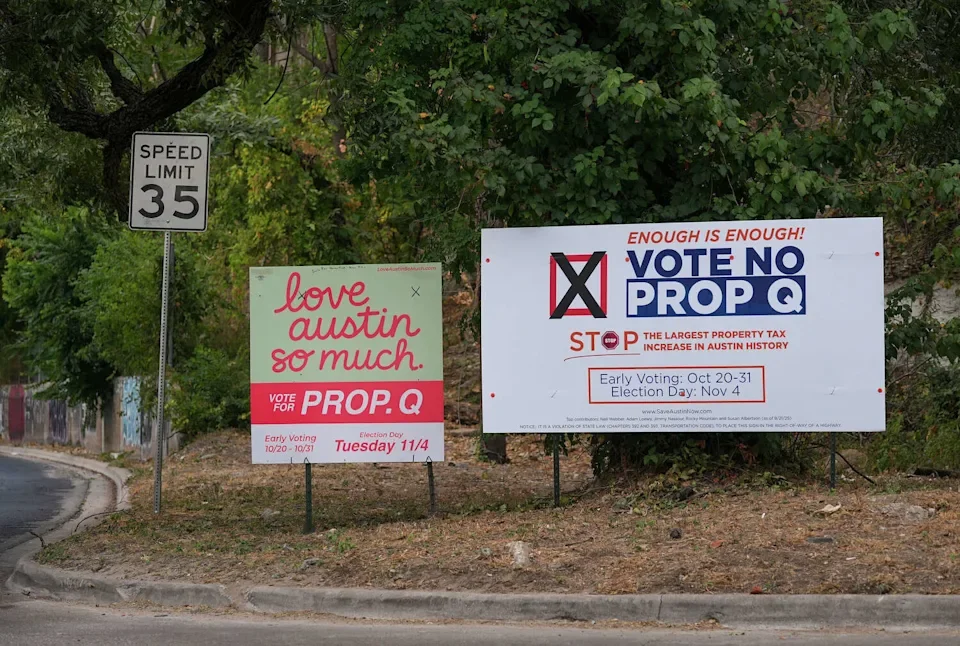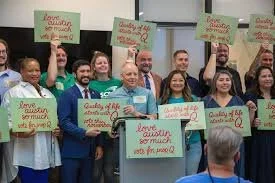What to Know About Prop Q: Austin’s Tax Proposal and What It Means for You
If you’ve driven through Austin lately, you’ve probably noticed the signs: “Vote Yes on Prop Q” near Palmer or Metric, and “Vote No on Prop Q” scattered around wealthier neighborhoods like Steiner Ranch and Westlake.
It’s an interesting contrast — one that says a lot about who might feel the impact of Proposition Q the most.
So, What Is Prop Q?
On November 4, Austin voters will decide whether to raise the city’s property tax rate to help fund public safety, homelessness programs, parks, and other city services. The proposal, called Proposition Q, would bump taxes up by about five cents per $100 of property value — which comes out to roughly $300 more a year for the average homeowner.
City leaders say the tax bump would bring in an extra $110 million to close a growing budget gap and keep essential programs afloat. Without it, they warn, Austin could face slower emergency response times, fewer resources for homeless outreach, and underfunded parks and libraries.
Why Supporters Say “Yes”
Supporters argue that Austin needs the money to keep essential city services running as the population grows. Without it, they warn, there could be cuts to: Emergency response times,
shelter and housing services, park maintenance and community programs.
They also say the new funding would help stabilize jobs for city workers and protect services that residents rely on every day.
Why Critics Say “No”
Opponents say Prop Q is a bandage on a bigger problem — that the city already collects plenty in taxes and just doesn’t spend wisely.
Their main points: Austin’s affordability crisis is already squeezing residents, and higher taxes will make it worse. City Hall should reprioritize existing funds instead of asking for more.
Many voters are asking a fair question:
“Why can’t our taxes already cover the things Prop Q is supposed to fix?”
Between housing costs, utilities, and inflation, it’s hard for people to understand why core services like public safety and homelessness response need another funding boost.
What About Renters?
Even though renters don’t get a property tax bill, they’re not off the hook.
If landlords pay more in taxes, they often raise rent to cover those costs.That means renters could see small bumps in their monthly payments — especially for single-family or small rental homes. It’s not immediate or guaranteed, but it adds to the upward pressure on rent that’s already pricing many people out of the city.
A City Split by ZIP Code
The pattern of yard signs tells its own story. In wealthier neighborhoods like Steiner Ranch or Davenport Ranch, “Vote No” signs are easy to spot — areas where homeowners already shoulder high property taxes. Meanwhile, “Vote Yes” signs are more common in working-class and central areas like North Lamar, Metric, and Palmer, where people are more likely to rely on the services Prop Q would fund.
It’s a snapshot of Austin’s economic divide: who can afford a tax hike, who depends on public programs, and who trusts City Hall to spend responsibly.
The Bottom Line
A “Yes” vote on Prop Q means higher property taxes — and more funding for public services. A “No” vote keeps taxes flat but could mean budget cuts or fewer city resources.
Either way, Prop Q forces Austin to face a bigger question:
Are we really short on money, or just spending it in the wrong places?



